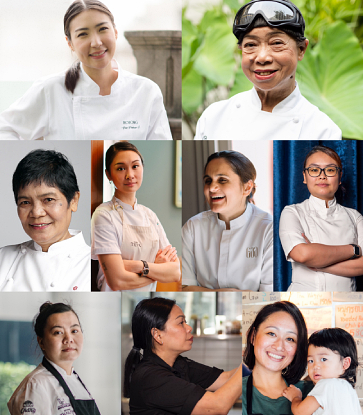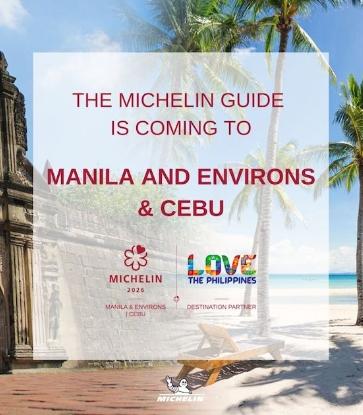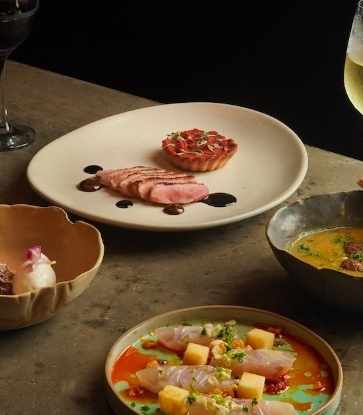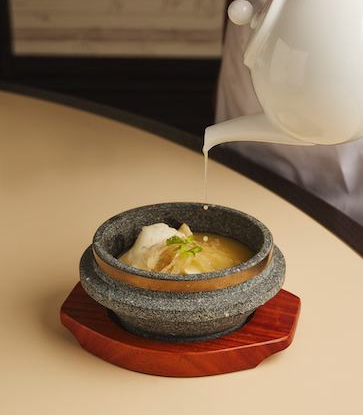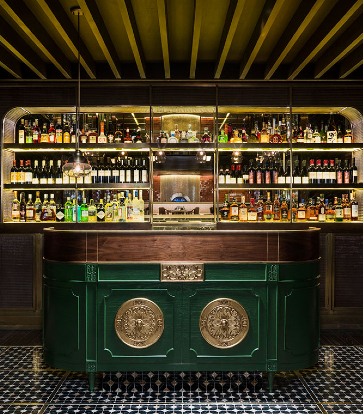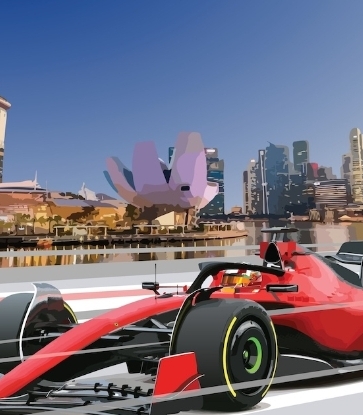For someone not familiar with Thai food, how would you explain it to them?
“Thai is a fresh, plant and herb based cuisine. When people eat Thai food, no one ingredient should overpower the other and everything must be fresh. Visually it’s bright and very lively inside the mouth. There are extreme diversities from dish to dish as we have a rich culinary heritage.
“Lastly, be prepared for a bit of chilli.”
What drew you to cooking and when did you decide cooking was a passion for you?
“Cooking was not a choice for me as I was born in to it… I grew up in a big family and my mother owned a small shop. Each day she would prepare dishes and that’s where I stared to understand cooking.
“When I was younger I never wanted to do it. Cooking when I was young seemed like a chore, I thought everything was so difficult: you had to get up at 5 AM every morning, squeeze the coconut milk for the curries and use the mortar and pestle for everything.
“I took some time away, but I went to work in the F&B industry and then met my partner (Jason Bailey). He wanted to train me as a Chef, and I said OK, so here I am.”

“Learn the culinary heritage of Thai cuisine before you start making any modern changes or renovations to the cuisine. A dish that does not breed culture is worthless.”
Chef Bee Satongun - Paste Bangkok (MICHELIN Guide Bangkok 2018 - One MICHELIN Star)
What’s the food memory that has stayed with you the most from your childhood?
“When I was young I was very curious and I liked eating everyone’s food and tried everything… it got to a point where my mother made me eat her food to save money.
“It has been more than 30 years but Thai flavours back then is what I remember most. Everything was different than today, even things from the street stall. This is what I try to achieve in my cooking today… it’s a reflection of a memory.
“At Paste, I want my customers to taste Thai cuisine like I did and have an experience that’s true and memorable full of Thai complexity that cannot be found anywhere else. Thailand has some of the most complex flavour combinations and at Paste we use a minimum of 30 ingredients.”
You’re known for reviving old forgotten Thai recipes and creative use of Thai flavours… why do you look into the past?
“For me, it’s not about something being old being better, or even applicable to modern diners. What I am trying to do is explore my understanding of Thai food’s elegance, layering and complexity of flavour.
“Looking in the past is me trying to understand what our ancestors were trying to communicate through their ingredients and flavours and who and the occasion they cooked for. They had a main ingredient and all their dishes followed a rhythm of flavour – each dish had its own unique roots.”
Who are you inspired by?
“For Thai food I take inspiration from the Snidwongse family cook book (Royal Thai Cuisine) and a few private sources. I try to apply their recipes in a contemporary context. It’s a fine balance between old and new as there are boundaries that the ingredients ensure you stay in. Maintaining the Thainess of the dishes is what’s most important for me.
“Outside of Thailand I look at Australian chefs who blend the European technique of cooking proteins with Asian flavours for example Tetsuya Wakuda (even though he is technically Japanese). Also, I spent some time training in Australia and having this experience has influenced and allowed me to broaden my vision of what I cook and what my perspective on modern Thai gastronomy is.”
For someone trying to do what you’re doing what advice do you give them?
“The traditional dishes, recipes, technique and overall heritage of Thai cuisine must be learnt and respected first and applied as the foundation. If you approach it from modern cuisine first, the soul of the dish gets lost.
“At Paste we modernise about 20% and we keep 80% of the original dish’s culture and heritage.”
Where do you see Thai cuisine going in the future? Do you think there will be more people like David Thompson and Henrik Andersen in the future?
“Apart from David, Henrik and a few others, Thai cuisine outside of Thailand has been at a standstill for a very long time. There are many reasons for this and one of them is probably due to Thai culture – it can be very complex. There will always be small amounts of curious international chefs experimenting with Thai food and I hope that in the future Thai nationals begin to lead the charge in renovating Thai cuisine, especially outside of Thailand.
“The Michelin Guide will help put much more focus on Thai food and local chefs, and I hope that it will give our chefs opportunities to explore and take Thai food internationally.”
Do you think the overall standard of Thai cooking will lift and people like you will inspire the next generation of local chefs?
“It has already started… the restaurant scene in Bangkok has changed drastically over the last 5 years even before the announcement of the Michelin Guide. What the Michelin Guide will do is ensure a more professional standard of cooking and food reviewing.”
What advice do you have for a young chef entering your kitchen or looking to go overseas?
“Learn the culinary heritage of Thai cuisine before you start making any modern changes or renovations to the cuisine. A dish that does not breed culture is worthless.”








